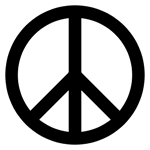Ethical issues
What do we do about 'evil dictators'?
Pacifism raises some difficult questions. Pacifists are commited to non-violence, but they have to deal with the problem of 'evil dictators'. In other words, what do you do if someone takes power by force, and gets rid of any democratic way of removing them from power? What if the dictator tries to take over other countries, or is determined to destroy a whole race of people?
What about genocide?
There have been many examples of genocide over the last century, and the pacifist has to explain how we can protect the innocent victims of genocide such as those in Rwanda in 1994 (800,000 were killed), or those currently in Darfur(300,000 have died).
What about our armies?
Another question is what to do with the military. Some pacifists believe that you should disband the military, but this is heavily critised, because it could leave your country as a 'sitting duck'. This just couldn't happen - if one country did this, they would be relying on other countries for protection, which makes them as reliant on the military as they were before. If all countries did this, which just would not happen, it would leave the world unstable, and would lead to much more violence.
However, there is a contradiction in agreeing that we need an army, but we should not use them under any circumstances.
What about nuclear weapons?
 Pacifism is often represented by the symbol for the Campaign for Nuclear Disarmement (it is a symbol made up of the semaphore letters for ND). If the money spent on nuclear weapons were to be spent on healing the world, the world would be a much more stable place and we wouldn't see people starting wars, pacifists argue*. The amounts of money are huge. However, the real question is how to get all countries to agree to disarm, and how you make sure that no-one develops nuclear weapons in the future.
Pacifism is often represented by the symbol for the Campaign for Nuclear Disarmement (it is a symbol made up of the semaphore letters for ND). If the money spent on nuclear weapons were to be spent on healing the world, the world would be a much more stable place and we wouldn't see people starting wars, pacifists argue*. The amounts of money are huge. However, the real question is how to get all countries to agree to disarm, and how you make sure that no-one develops nuclear weapons in the future.
*There are many examples of this sort of argument. for example, this is taken from a NWIP Factsheet:
"The US has spent more than 5.5 trillion $ in developing their nuclear arsenal and France has spent about 1.5 trillion $. And these numbers do not include the costs of testing, fissile material production, storage and disposal. The costs for other nuclear weapon states are probably similar, but those numbers are not publicly available.
"To put this into perspective the price of global elimination of starvation, provision of health care, provision of shelter and clean water, elimination of illiteracy, provision of sustainable energy, debt relief for developing countries, clearance of landmines and more has been estimated to be about 260 billion $ annually for 10 years."
